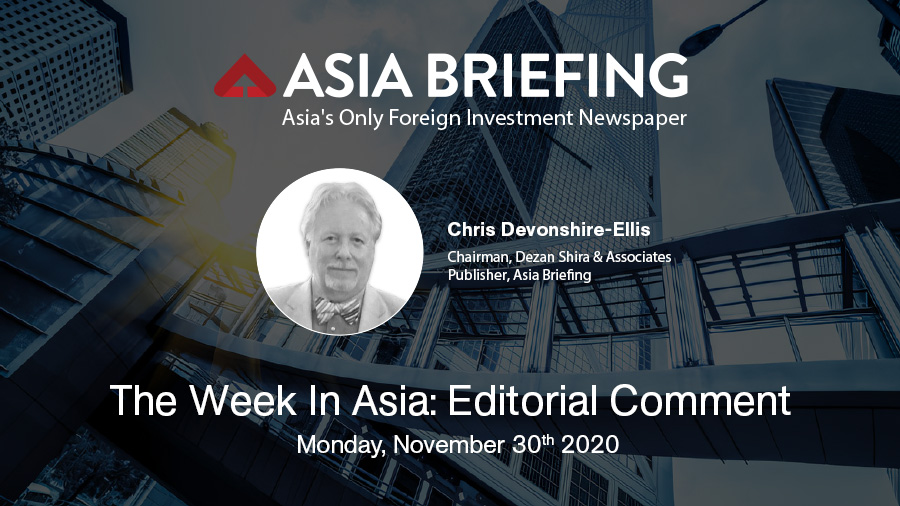Monday, November 30

As we move into the final month of the year, thoughts are turning to the end of the Covid-19 pandemic and towards 2021 and what the new year will bring. Preparation is key.
While the sight of various vaccines is welcome, it has remained a distressing feature of the pandemic that East and West remain at loggerheads over responsibility and even more petty, whose vaccine works best. The Russians appear to have rushed out their Sputnik V, and received brickbats from the medical community for doing so; while it appears that the UK’s Oxford vaccine results are tainted by it not being tested on anyone over 55. There are financial considerations too; Brazil and South Africa have asked the WTO to waive royalty rights for Covid-19 medicines, with both China and Russia (who have both produced them) in agreement with this suggestion. The United States and the West are against this; seeking to recoup and profit from the distribution of anti-Covid vax. This is abhorrent, and needs strong and emphatic global leadership to remedy. As one global community, we share a common responsibility to one another regardless of race or creed, regional jealousies and competition. For this is it apparent that some of the global initiatives in place since the end of World War II are no longer effective in this day and age and need adjustment. This is why calls from Russia, China and India to restructure organisations such as the United Nations, WTO and the WHO are valid and ought to be heard. Nature’s warning is clear, less the world’s leaders solve this problem we will be doomed to repeat it – and the next virus that arrives, as it surely will, may not be so forgiving.
The so-called Post-Covid era meanwhile will take some time to materialize, and it will be months before enough vaccines can be manufactured and properly distributed. Hot spots such as Africa, India, and South America will continue be problematic with huge populations and inadequate healthcare and facilities. Global inequality is a serious issue and it remains obscene that people such as Jeff Bezos, whose business has been admittedly effective this past year, does so at shipping rates that often out strip the actual value of the goods being sold. That he is worth US$186 billion – more than the annual GDP output of Hungary or Romania, and double that of countries sch as Sri Lanka indicates that the global system is broken. Covid has brutally exposed the global inequalities. The UN and major powers must concede some of that wealth and power or problems such as viruses, which expose humanities weaknesses will return again and again.
Planning for 2021 therefore is key. Covid-19 has already introduced, through necessity, apps and softwares to allow businesses to ride over disruptions in the workplace. Where for example was Zoom twelve months ago? Nations and their businesses that are keen to embrace digitization will benefit as business procedures and administration changes, and development of transactional processes in particular are and will continue to change the very way in which we operate our businesses. We have just published a complimentary magazine about this, “Restructuring Your China Business To Outperform In The New Normal” while the past few issues of our China Briefing as well as ASEAN Briefing deal with business upgrades that can help companies through these difficult times. Just access our publications store at www.asiabriefing.com. A subscription is required to download these magazines, however this is also complimentary.
We move on from the practical aspects of business operations to look at where regional opportunities lie. Covid, the needs it has created and many Asian governmental responses to this have opened up the foreign investment doors to healthcare, logistics, and many other industries as Governments seek to boost their economies in 2021. We examine many of these here on Asia Briefing, where our ‘Business Opportunities 2021’ section contains numerous overviews of where foreign investors may start to look for new openings in China, India, and the various ASEAN countries. We also examine the less obvious options, such as the huge changes that are taking place in the Russian Arctic. What has that got to do with Asia? The Northern Sea Passage is opening up and reduces the time it takes to ship from Asia to Europe by 60%. Supply chains will change, while Russia has made the entire region the world’s largest Free Trade Zone, meaning duty free imports. Corporate accountants will soon be asking ‘Why are we not shipping via the Northern Sea route?’ – we lay out the investment potential for facilitating such developments, where and why.
Finally, after the success of last week’s African Belt & Road summary, this week we feature the growing Interconnectivity between China and Europe, which my colleague Riccardo Benussi also discusses in this week’s Dezan Shira & Associates Partner commentary.
As always there is plenty to look at. 2021 will be full of challenges, and preparing your businesses is key in allowing them to get over these and prosper.
Stay safe!
Best regards;

Chris Devonshire-Ellis
Chairman, Dezan Shira & Associates
Publisher, Asia Briefing
E: editor@asiabriefing.com
W: www.dezshira.com
Disclaimer
Any views or opinions represented in this blog are personal commentary, belong solely to the contributor and do not necessarily represent the views of Asia Briefing Limited or Dezan Shira & Associates.


